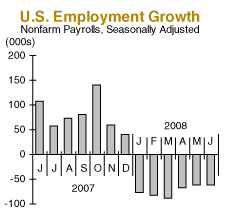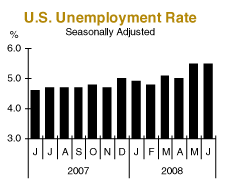|
July 9, 2008
Sixth Down
Written by Jeff Thredgold, CSP, President, Thredgold Economic Associates
The June employment data released on July 3 was more of the same. Highlights (actually lowlights) included a painful decline in overall employment, a downward revision to employment data of the two prior months, and the jobless rate remaining at a four-year high.
Good employment news has been hard to find in recent months. However, one major positive factor can be noted. Job losses this time around the (presumed) recession track are much less than losses during the 2001 recession.
The Numbers
 The American economy suffered an estimated 62,000 net decline in total jobs during June, matching economists’ consensus expectation, and the sixth consecutive month of declining employment. Adding insult to injury were revisions to April and May employment data suggesting that a combined 52,000 more jobs were lost than prior estimates suggested. The American economy suffered an estimated 62,000 net decline in total jobs during June, matching economists’ consensus expectation, and the sixth consecutive month of declining employment. Adding insult to injury were revisions to April and May employment data suggesting that a combined 52,000 more jobs were lost than prior estimates suggested.
Recession? Note that at no time during the past 50 years has the U.S. economy recorded six consecutive months of declining employment without being in a you-know-what.
As we have noted frequently in recent months, a scenario can be developed wherein the U.S. economy records no or only one quarter of declining real (inflation adjusted) economic growth (GDP), only to have the economy’s “official scorekeeper”…the National Bureau of Economic Research…come out later this year and announce that a U.S. recession officially began sometime around year-end 2007 or early in 2008.
|
Bad News Sells…
Note: a number of Tea Leaf readers have challenged me in recent months on my frequently taking the national media to task for its constant and, in my view, irresponsible badmouthing of the housing sector and the overall economy. The collective view of much of the media is simply this, “Why would you even think about buying a home now when they will obviously be cheaper in 6-12 months?”
I present the July 7, 2008 issue of Business Week as an example. The cover story is entitled THE HOME PRICE ABYSS…WHY THE THREAT OF A FREE FALL IS GROWING.
The American home building and home resale sector should be up in arms about such negative reporting. I recall the good old days when Business Week was a business-friendly, business-supportive magazine…
…I guess their owners have clearly established the fact that “bad news sells newspapers”...
…but I digress
|
|
The nation’s unemployment rate remained at a four-year high of 5.5% in June, matching May’s rate. Of particular concern was the rise in the number of unemployed people now out of work for six months or more.
 As before, American job losses in June were primarily found in goods producing sectors…although microscopic service sector gains were nothing to write home about. The nation’s goods production sector lost 69,000 net jobs during June, led by the loss of another 43,000 jobs in the nation’s beleaguered construction sector. Total construction sector employment is down a painful 528,000 jobs since peaking in September 2006. More ominous is the fact that additional job losses are expected in coming months. As before, American job losses in June were primarily found in goods producing sectors…although microscopic service sector gains were nothing to write home about. The nation’s goods production sector lost 69,000 net jobs during June, led by the loss of another 43,000 jobs in the nation’s beleaguered construction sector. Total construction sector employment is down a painful 528,000 jobs since peaking in September 2006. More ominous is the fact that additional job losses are expected in coming months.
Manufacturing also fared poorly, with the loss of another 33,000 jobs. The nation’s manufacturing sector has lost 353,000 jobs during the past 12 months. Such losses have occurred even as U.S. manufactured exports have grown briskly during the past year, taking advantage of strong global demand and a weaker U.S. dollar, both of which enhance the appeal of U.S.-made goods.
The nation’s service providing sector reported an abysmal gain of 7,000 jobs in June. Professional & business services lost 51,000 jobs, while retail trade employment fell by 8,000 positions. Much better news saw the gain of 29,000 net new jobs in education & health services; 29,000 new jobs in government; and 24,000 net new jobs in leisure & hospitality.
…Versus 2001
The estimated net decline of 438,000 jobs during 2008’s first half was a painful contrast to the average annual gain of 1.9 million net new jobs during 2005 to 2007. However, the average loss of 73,000 jobs monthly during 2008’s first six months was much less painful than the 181,000 average monthly job loss during the 2001 recession.
The average hourly wage rose 0.3% (six cents) as expected to $18.01, with a 3.4% rise since June 2007. The 12-month gain was the smallest since the similar period ending in January 2006 and lagged the 4.2% rise in consumer prices during the latest 12 months available.
|
ECB Rate Hike
Another major development last week was a monetary tightening move by the European Central Bank (ECB), the European counterpart to the Federal Reserve in the U.S. Why would the ECB raise its key interest rate, even as European economic growth is slowing sharply?...
…Because the mandate of the ECB is solely focused on inflation containment. The 4.0% rise in European consumer prices of the past 12 months is widely outside of the ECB’s target of 1.0%-2.0% inflation. The tightening move was widely expected. The ECB’s President, Jean-Claude Trichet did note that one should not expect additional tightening moves anytime soon.
|
|
Candidate Fodder
As noted, the nation’s unemployment rate remained at 5.5% in June. Note a couple of key points that presidential candidates are likely to make in coming months, including during the presumed debates.
McCain will likely remind us that even as the unemployment rate has increased during the past year, the 5.1% average jobless rate of the past 7 ½ years—with a Republican in the White House—was below the average during the 1970s, 1980s, and 1990s.
Obama will note that Republican leadership has largely been a failure. He will likely point out that when one adds to those “officially” counted as employed both 1) people who have become discouraged and thus given up looking for work, and 2) those who have been involuntarily reduced from full-time employment to part-time jobs, the so-called underemployment rate is 9.9%, sharply above the 8.3% level of a year ago.
Fed Response?
Those calling for an immediate boost in the Fed’s key short-term interest rate to subdue inflation will have to wait for awhile. Our best guess has the Fed beginning to tighten later in the year, or early in 2009…
…stay tuned
• Email this article to a friend
• Learn about econAmerica, Jeff’s latest book
|
|
Subscribe to the Tea Leaf
Like what you just read? Have Jeff Thredgold’s Tea Leaf emailed to you free each week. Subscribe today.
|
|
|

“Tea”ser
Economists have forecast 9 out of the last 5 recessions.
• Send us a “Tea”ser

“Tea”stimonial
“You are a meeting planner’s dream. Not only were you rated the best speaker by our convention attendees, but also numerous survey responses that were received indicated that one of the best things about this convention was Jeff Thredgold. You can be assured that I will recommend you to others.”
—Cathy Kelly, VP, Iowa Independent Bankers
• More testimonials
Invite Jeff Thredgold to speak at your next conference, meeting, or client function
If you like the Tea Leaf, you’ll love Jeff Thredgold’s live presentations. Jeff takes your audience on a timely, engaging, and entertaining tour of the U.S. economy and financial markets. Debunking some of today’s most common economic myths, he offers a clear picture of how the American economy is really performing and what that means for the future of your finances.
• Watch video clips of a Jeff Thredgold presentation.
• Download more information that you can e-mail to other decision makers.
• See Jeff Thredgold’s speaking calendar.
• Tell us about your event using our online form and we will contact you. Or, is there an individual in your organization you would like us to contact?
• Give us a call at 1-888-THREDGOLD (847-3346) to ask about Jeff’s availability and pricing for your event, or for any other information.
|
